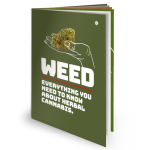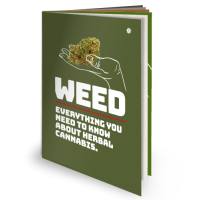WEED
EVERYTHING YOU NEED TO KNOW ABOUT HERBAL CANNABIS.
Information and advice on potency, health issues, dependency, and tips on how to cut down or stop.
In this booklet, when we say ‘cannabis’, we mean ‘herbal cannabis’ or what’s commonly called skunk, weed, herb, grass, green, or bud. But names can change depending on where you live.
It’s the dried flowers and leaves of the cannabis plant, different from hashish (resin) or synthetic cannabinoids like spice.
Increasingly, cannabis is consumed in herbal rather than resin form. It’s usually smoked in joints, pipes, or vaporisers, but can also be drunk as a tea, or eaten in some kind of bake or cooking.
Over the last 30 years, cannabis has been the most used illegal drug in England and Wales. The most recent UK figures (taking us to March 2023) suggest just over 2.6 million adults aged 16 to 59 used cannabis in the last year. The true figure is probably much higher.
These days, a significant amount of herbal cannabis is grown in the UK, but we still import a substantial amount, particularly cannabis resin, from Europe and North Africa.
The information on this page will help you understand what cannabis is, the warning signs of developing a problem, reducing the risks, and how to cut down or stop.
The bits that get you stoned
The cannabis plant contains hundreds of naturally occurring chemicals – sixty of which, known as cannabinoids, are unique to the plant.
Out of these, two chemicals matter when it comes to getting stoned: THC (tetrahydrocannabinol), which is the main psychoactive substance, and CBD (cannabidiol).
THC is responsible for the euphoric high and that feeling of being ‘stoned’. It can also make you feel paranoid and anxious, particularly if the cannabis you’re taking contains high levels of THC.
CBD, on the other hand, has a calming and relaxing effect.
It’s possible the CBD might cancel out some of the paranoia or anxiety that comes from the THC – but the evidence is mixed on this.
If herbal cannabis gives you panic attacks or makes you feel edgy and anxious, it’s best to stop using it. If you can’t, or don’t want to stop, try switching to resin (hash), which has higher levels of CBD.
The strength and potency of cannabis
Strength describes the intensity of the high from cannabis, while potency refers to the percentage of THC in the
plant’s resin.
Less resin with high THC will produce a higher high than more resin with low THC. The strength also varies based on the plant variety, cultivation method, part consumed, preparation, and storage.
In the early 2010s, average THC content in cannabis was lower than today. By the early 2020s, THC levels had risen significantly, with strains like ‘skunk’ bred for high THC. Advances in cultivation techniques continue to produce even more potent cannabis strains.
Cannabis and mental health
Not everyone who uses cannabis will develop mental health problems.
However, evidence suggests that it may worsen existing mental health issues in some people, particularly if they’re smoking cannabis that’s high in THC. It may also bring on mental health issues, such as psychosis, in anyone with an condition they may not have been aware of.
Cannabis users with close relatives who have episodes of psychosis or schizophrenia might have a higher genetic risk of experiencing similar issues.
Psychosis includes hallucinations and delusions.
Hallucinations make someone experience things that other people aren’t, including hallucinations or
hearing voices.
Delusions are when people have unusual beliefs that other people don’t, and feeling detached from reality.
Schizophrenia is a mental illness that affects how someone thinks or feels. Symptoms of schizophrenia include hallucinations and delusions. But often it will have other symptoms like feeling flat or emotionless or withdrawing from other people.
If you feel your cannabis use is affecting your mental health, you should stop using it. If you can’t stop, try using a less potent form of cannabis, like cannabis resin (hash) and get medical help or talk to your local drug and alcohol service.
Young People and Mental Health
Teenagers and young adults, whose brains are not yet fully developed, are particularly at risk of mental health issues. Studies have found that starting and regularly using cannabis at a young age can lead to lasting cognitive problems, which don’t fully go away, even if the person quits using cannabis later in life.
Physical Health
Smoking harms the lungs. Inhaling any burning organic matter releases harmful toxins into your body. Cannabis can also contain pesticides and
fertilisers used during its production, as well as bacteria which grows on the buds and can compromise the immune system. This can be a problem for those living with HIV/AIDS or, cancer.
Are you fed up of getting stoned?
Some people have a positive experience using cannabis, but it can become an issue for others.
You may be getting bored with being stoned. It might be affecting your health, draining your finances, and interfering with your relationships, education, or work.
If you’ve been using more cannabis than before, feel moody or irritable without it, spend a lot of time acquiring and recovering from its effects, and notice that it’s replaced other activities you used to enjoy, it might be time to consider cutting down or stopping.
If you recognise any of these, it could be time to think about your cannabis use.
There are several steps you can take, which may help.
1. Think about why you want to change
Put together a list of pros and cons about your cannabis use
You can refer to this during moments of weakness, to remind yourself why you decided to make changes in the first place.
Create a cannabis diary
Create a diary of how much you smoked in the last week or two. Make a note of how much you spent, where you smoked and who you were with. It will help to motivate you and identify high-risk situations
2. Plan ahead
Tell your friends or family that you intend to break the habit
It makes it easier to refuse a joint when it’s offered, and your friends and family understand more if you’re being a bit on edge.
Think about high-risk situations
Take temptation away by avoiding situations where you’d normally getting stoned.
Cravings and withdrawal symptoms
Withdrawal symptoms will depend on how much you normally smoke and how long you’ve been smoking. They can include any of the following:
- irritability
- a craving to smoke
- anxiety
- depression
- anger
- confusion
They can have a physical effect on you such as the following:
- problems sleeping
- restlessness
- loss of appetite
- tremors
- sweating (mainly at night)
Symptoms start between one and three days after stopping cannabis and last for around two weeks. They’re not harmful and are in fact a positive sign that your body is adapting to being.
Cravings last only a few minutes so if you can distract yourself for about 10 minutes whenever you get one (such as going out for a walk), then the urge will pass and each one will get easier.
Start to cut down
Some people find it easier to give up completely by cutting down on their cannabis use beforehand. Delay the first smoke of the day, put less cannabis in each joint, or simply have fewer joints.
3. Getting on with it
Deal with high-risk situations
Clear your flat of any cannabis paraphernalia, including skins, pipes, bongs, etc. Delete your dealer’s number from your phone.
Stay active
Doing an activity will help take up the space in your head that cannabis occupied.
Do something new
Start a new hobby or enrol on a course.
Look after yourself
To lower your stress levels, eat a healthy diet, get as much sleep as you can, drink plenty of water and exercise.
4. Keep going
You might not succeed the first time, especially if you’ve been smoking cannabis a long time. Don’t beat yourself up about it. You haven’t failed, you’ve just taken the first step. Try again. It’ll probably be easier next time.
Reduce the risks of using cannabis
AVOID TOBACCO
Cannabis has its share of tar and toxins so it’s best to avoid adding to the risks by combining it with a damaging and addictive substance like tobacco.
UNFILTERED JOINTS
ONLY USE GLASS, STAINLES STEEEL, OR BRASS BONGS OR PIPES
Bongs made from plastic, wood, rubber, or aluminium cans give off toxic fumes when they get hot.
And when a bong or pipe is passed to you, bear in mind that it could contain bacteria or viruses from others who’ve used it. Probably best to stick to using your own.
TAKE SMALLER PULLS FROM YOUR JOINT
Most of the THC in the joint gets absorbed by your lungs in the first few seconds, so no need to hold the smoke in there deeper or for longer. It only increases the damage to your lungs.
VAPORISERS
EATING IT
You can add cannabis to food that you’re cooking, but the effects can take an hour or two to start, a few hours to peak and might last for up to 12 hours or more. So don’t eat a piece of hash cake and, a few minutes later, eat some more because you don’t think it’s working. Give it a chance to get going before you neck some more.
Cannabis and the law
Cannabis is illegal. It is a class B drug. It’s against the law to possess, sell, give away, grow, or let your premises be used for smoking it
Possession can get you up to 5 years in prison, an unlimited fine, or both. Supply and production can result in up to 14 years in prison, an unlimited fine or both.
Some police forces will deal with possession for personal use by steering you away from the criminal justice system, especially if you’re under 18. Instead, they pick from the following options:
- Issue a warning.
- Make you pay an on-the-spot fine.
- Give you a ‘community resolution’ (e.g. make you do an educational course on drugs). You won’t get a criminal record, but it will show up on an enhanced DBS check.
- Issue a ‘conditional caution’ (e.g. a rehabilitation course, unpaid work, or a fine). A conditional caution will go on your criminal record.
A persistent offender will be prosecuted. Find out about penalties here:
gov.uk/penalties-drug-possession-dealing
If you’re under 18
The police will make a note of the incident. A first offence might receive a youth caution, which is a formal warning. If it’s not your first, you might get a youth conditional caution, which could involve attending drug education and support programmes. This approach is intended to keep you out of the criminal justice system and to support, rehabilitate and educate instead.
For repeat offences, you could be taken to youth court, which might result in fines, community orders, or even detention. Initial cautions aren’t criminal convictions, but are recorded and can affect future opportunities and travel.
Growing cannabis
People growing a small number of plants can often be charged with possession, supply and production. If convicted, you could get a short prison sentence. Commercial growers face even longer inside.
Drug driving
You might think that cannabis is safer than alcohol, but it slows down reactions and focus wanders. It can also cause paranoia, drowsiness, distorted perception and a sense of disorientation – all of which could make you lose control.
The effects of cannabis fade after a matter of hours, but it can be detected in your body for up to four weeks.
It’s illegal to drive with over the permitted level of cannabis in your system. If you test positive, you can receive a driving ban, large fine, or go to prison.
A criminal record can affect your future employment and travel.
Even spent convictions that don’t need to be declared can show up.
There are also lots of everyday jobs that require an ‘enhanced check’ such as teaching, driving a taxi and becoming a soldier.
Each country has its own set of laws on drug convictions, which might cause you travel problems.
More cannabis information
-
FRANKCall 24 hours a day, 365 days a year, FRANK is around to give you FREE info on drugs.
-
RELEASERelease is the national centre of expertise on drugs and drugs law – providing free and confidential specialist advice to the public and professionals.. Helpline 0845 4500 215
-
NHSAdvice, tips and tools to help you make the best choices about your health and wellbeing.
-
RETHINKSupporting people severely affected by mental illness



















